英语中复合句的类型--宾语从句 状语从句 定语从句
初中英语语法三大从句
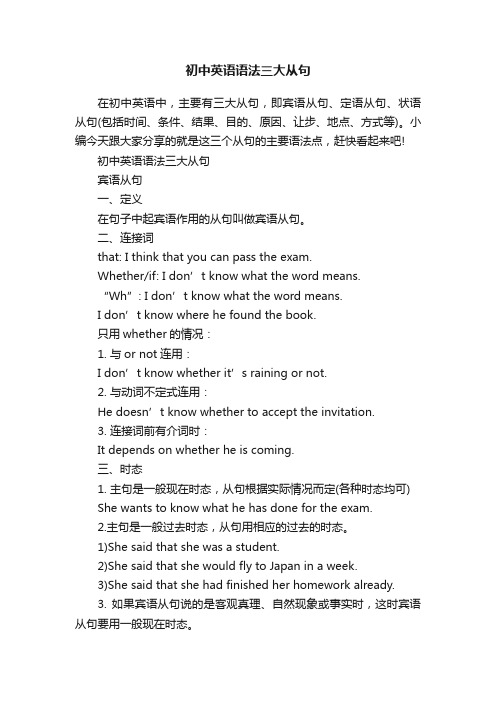
初中英语语法三大从句在初中英语中,主要有三大从句,即宾语从句、定语从句、状语从句(包括时间、条件、结果、目的、原因、让步、地点、方式等)。
小编今天跟大家分享的就是这三个从句的主要语法点,赶快看起来吧!初中英语语法三大从句宾语从句一、定义在句子中起宾语作用的从句叫做宾语从句。
二、连接词that: I think that you can pass the exam.Whether/if: I don’t know what the word means.“Wh”: I don’t know what the word means.I don’t know where he found the book.只用whether的情况:1. 与or not连用:I don’t know whether it’s raining or not.2. 与动词不定式连用:He doesn’t know whether to accept the invit ation.3. 连接词前有介词时:It depends on whether he is coming.三、时态1. 主句是一般现在时态,从句根据实际情况而定(各种时态均可)She wants to know what he has done for the exam.2.主句是一般过去时态,从句用相应的过去的时态。
1)She said that she was a student.2)She said that she would fly to Japan in a week.3)She said that she had finished her homework already.3. 如果宾语从句说的是客观真理、自然现象或事实时,这时宾语从句要用一般现在时态。
The teacher said that the earth goes round the sun.定语从句一、定义在复合句中修饰名词、代词的从句叫定语从句。
英语从句(状语从句、宾语从句、定语从句)
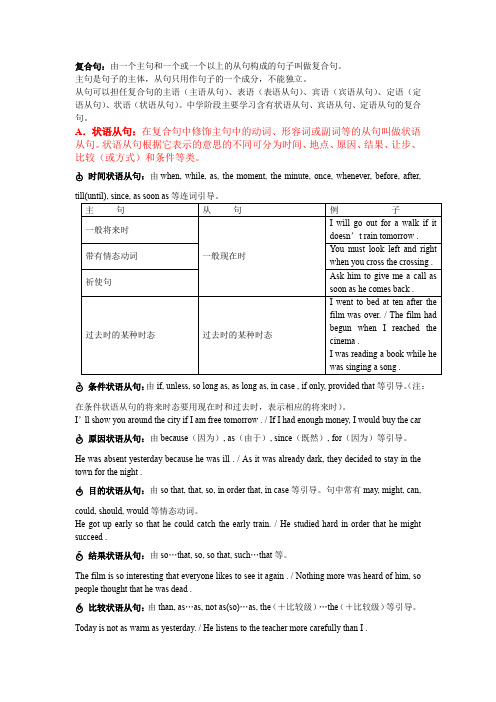
复合句:由一个主句和一个或一个以上的从句构成的句子叫做复合句。
主句是句子的主体,从句只用作句子的一个成分,不能独立。
从句可以担任复合句的主语(主语从句)、表语(表语从句)、宾语(宾语从句)、定语(定语从句)、状语(状语从句)。
中学阶段主要学习含有状语从句、宾语从句、定语从句的复合句。
A.状语从句:在复合句中修饰主句中的动词、形容词或副词等的从句叫做状语从句。
状语从句根据它表示的意思的不同可分为时间、地点、原因、结果、让步、比较(或方式)和条件等类。
○1时间状语从句:由when, while, as, the moment, the minute, once, whenever, before, after,○2条件状语从句:由if, unless, so long as, as long as, in case , if only, provided that等引导。
(注:在条件状语从句的将来时态要用现在时和过去时,表示相应的将来时)。
I’ll show you around the city if I am free tomorrow . / If I had enough money, I would buy the car○3原因状语从句:由because(因为), as(由于), since(既然), for(因为)等引导。
He was absent yesterday because he was ill . / As it was already dark, they decided to stay in the town for the night .○4目的状语从句:由so that, that, so, in order that, in case等引导。
句中常有may, might, can,could, should, would等情态动词。
He got up early so that he could catch the early train. / He studied hard in order that he might succeed .○5结果状语从句:由so…that, so, so that, such…that等。
英语中的复合句
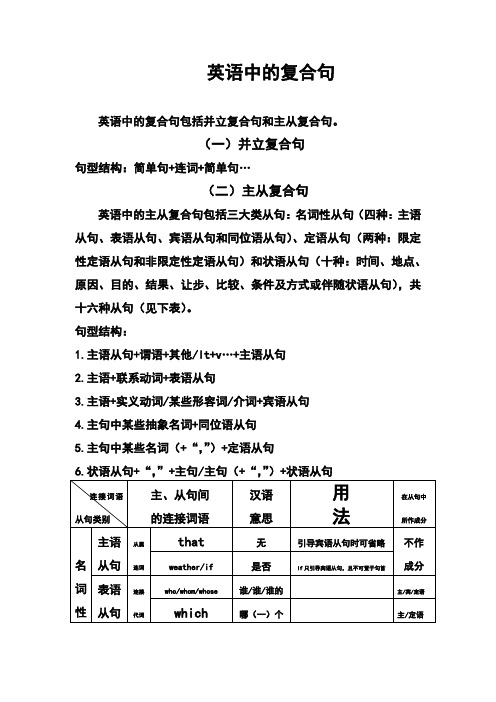
英语中的复合句
英语中的复合句包括并立复合句和主从复合句。
(一)并立复合句
句型结构:简单句+连词+简单句…
(二)主从复合句
英语中的主从复合句包括三大类从句:名词性从句(四种:主语从句、表语从句、宾语从句和同位语从句)、定语从句(两种:限定性定语从句和非限定性定语从句)和状语从句(十种:时间、地点、原因、目的、结果、让步、比较、条件及方式或伴随状语从句),共十六种从句(见下表)。
句型结构:
1.主语从句+谓语+其他/It+v…+主语从句
2.主语+联系动词+表语从句
3.主语+实义动词/某些形容词/介词+宾语从句
4.主句中某些抽象名词+同位语从句
5.主句中某些名词(+“,”)+定语从句
6.状语从句+“,”+主句/主句(+“,”)+状语从句。
复合句(宾语从句、状语从句、定语从句)(2013年真题为例)

名师点睛
考点过关
名师点睛 考点过关
语法互动(十四)┃ 复合句
(2) 由 if 或 whether 引导的宾语从句 if 和 whether 表示“是否”,在句中不作任何成分,通常 可以互换。(从句中有or not时,只能用 whether)。如: I wonder whether or not he has come back. 我想知道他是不是已经回来了。 (3)由疑问代词或疑问副词引导的宾语从句,疑问代词 who, what, which, whom在从句中作主语或宾语。疑问副词 when, where, why, how 等在从句中作状语。如: Do you know where he lives? 你知道他住在哪儿吗?
名师点睛
考点过关
语法互动(十四)┃ 复合句
(3)当先行词为all, something, everything, none, much, no one, the one 等代词时。如: There is nothing that belongs to you in the room. 这个房间里没有属于你的东西。 (4)当先行词既有人又有物时。如: We talked about the persons and things that we remembered. 我们谈论了我们所记得的人和事。 (5)主句是以which引导的特殊疑问句。如: Which of the books that you bought yesterday was written by Mo Yan? 你昨天买的哪本书是莫言写的?
名师点睛 考点过关
语法互动(十四)┃ 复合句
4.He said that light ________much faster than sound. C A.has travelled B. travelling C. travels D. travelled 5.—Could you tell me ________ ? C —It's twenty minutes' ride by bike. A. how can I get to your school B.how much it costs to get to your school C.how far it is from your home to your school D.how long does it take me to get to your school
复合句(宾语从句、状语从句、定语从句)

❖4.because与so, although/though与but不 能同时用在一个主从复合句中。如:
❖Though/Although they were very tired, they kept working. ❖尽管他们很累,但仍然继续工作。
C.how
❖【解析】此题考查that引导的陈述句作宾语 从句。
❖( D )3.[2012·广东] If our government ________ attention to controlling food safety now, our health ________in danger. ❖A.won't pay; is ❖B.doesn't pay; is ❖C.won't pay; will be ❖D.doesn't pay; will be
❖(2)以whether 或 if 引导的一般疑问句或选 择疑问句作宾语的从句,从句改用陈述语序。 if/ whether意为“是否”,但与or连用分别引 导两个分句,或用于不定式前、介词后或直 接与 or not 连用时,只能用whether。如:
❖I don't know whether he will come or not. ❖我不知道他是否来。
❖考点3 定语从句
❖1.关于定语从句的概念
❖(1)定语从句就是在复合句里充当定语的从 句,它通常紧靠在所修饰的名词或代词后面。
❖(2)先行词就是被定语从句修饰的名词或代 词。
❖(3)关系词:引导定语从句的词叫关系词。
❖2.引导定语从句的关系词: 关系代词有 who (whose, whom), which, that; 关系副词 有when, where, why。
英语三大从句

英语三大从句 Prepared on 22 November 2020英语三大从句在英语中,主要有三大从句,即名词性从句(包括主语从句,宾语从句,表语从句,同位语从句)、形容词性从句(即定语从句)、副词性从句(即状语从句,包括时间、条件、结果、目的、原因、让步、地点、方式等)。
定语从句一、关系代词引导的定语从句关系代词代替前面的先行词,并且在定语从句中充当句子成分,可以作主语、宾语、定语等。
常见的关系代词有:who, that, which。
它们的主格、宾格和所有格如下表所示:(一)关系代词who, whom和 whose的用法who代替人,是主格,在定语从句中作主语。
An architect is a person who designs buildings. 建筑师是设计房屋的人。
whom代替人,是宾格,在定语从句作宾语,在非正式英语常可省略。
Do you know the gentleman whom we met in the school library yesterday 昨天我们在学校图书馆里遇到的那位先生你认识吗whose一般代替人,有时亦可代替物,是所有格,在定语从句作定语。
The girl student whose father is a senior engineer used to study abroad. 其父是一位高级工程师的那个女学生过去在国外留学。
Do you know the name of the hotel whose window we can see here 我们这儿能看到窗户的那个宾馆叫什么名字,你知道吗(关系代词whose指代先行词hotel,正式用法应该用of which。
whose window=the window of which,意思是:the window of the hotel。
)(二)关系代词which的用法which代替物,在定语从句作主语或宾语,作宾语时还可省略。
初中英语语法三大从句汇总
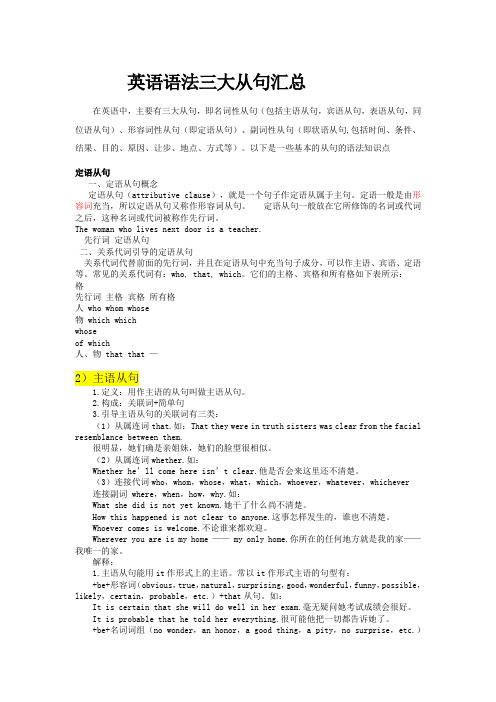
英语语法三大从句汇总在英语中,主要有三大从句,即名词性从句(包括主语从句,宾语从句,表语从句,同位语从句)、形容词性从句(即定语从句)、副词性从句(即状语从句,包括时间、条件、结果、目的、原因、让步、地点、方式等)。
以下是一些基本的从句的语法知识点定语从句一、定语从句概念定语从句(attributive clause),就是一个句子作定语从属于主句。
定语一般是由形容词充当,所以定语从句又称作形容词从句。
定语从句一般放在它所修饰的名词或代词之后,这种名词或代词被称作先行词。
The woman who lives next door is a teacher.先行词定语从句二、关系代词引导的定语从句关系代词代替前面的先行词,并且在定语从句中充当句子成分,可以作主语、宾语、定语等。
常见的关系代词有:who, that, which。
它们的主格、宾格和所有格如下表所示:格先行词主格宾格所有格人 who whom whose物 which whichwhoseof which人、物 that that —2)主语从句1.定义:用作主语的从句叫做主语从句。
2.构成:关联词+简单句3.引导主语从句的关联词有三类:(1)从属连词that.如:That they were in truth sisters was clear from the facial resemblance between them.很明显,她们确是亲姐妹,她们的脸型很相似。
(2)从属连词whether.如:Whether he’ll come here isn’t clear.他是否会来这里还不清楚。
(3)连接代词who,whom,whose,what,which,whoever,whatever,whichever 连接副词 where,when,how,why.如:What she did is not yet known.她干了什么尚不清楚。
高考英语主从复合句(状语从句、名词性从句和定语从句)
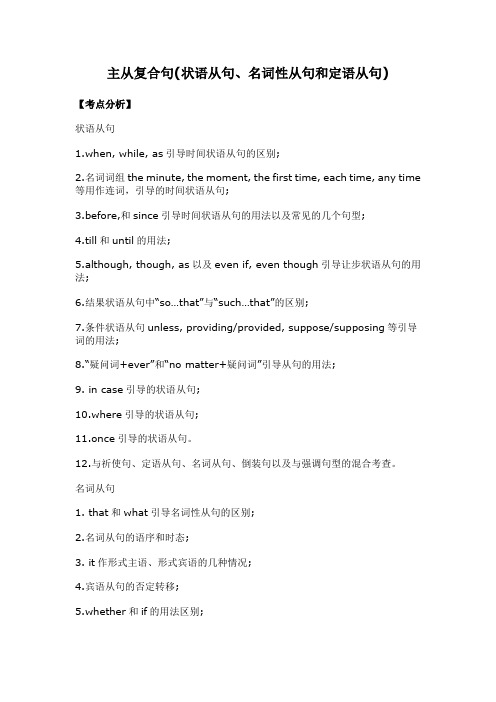
主从复合句(状语从句、名词性从句和定语从句)【考点分析】状语从句1.when, while, as引导时间状语从句的区别;2.名词词组the minute, the moment, the first time, each time, any time 等用作连词,引导的时间状语从句;3.before,和since引导时间状语从句的用法以及常见的几个句型;4.till和until的用法;5.although, though, as以及even if, even though引导让步状语从句的用法;6.结果状语从句中“so…that”与“such…that”的区别;7.条件状语从句unless, providing/provided, suppose/supposing等引导词的用法;8.“疑问词+ever”和“no matter+疑问词”引导从句的用法;9. in case引导的状语从句;10.where引导的状语从句;11.once引导的状语从句。
12.与祈使句、定语从句、名词从句、倒装句以及与强调句型的混合考查。
名词从句1. that和what引导名词性从句的区别;2.名词从句的语序和时态;3. it作形式主语、形式宾语的几种情况;4.宾语从句的否定转移;5.whether和if的用法区别;6.what在名词性从句中的使用;7.doubt后的名词性从句的使用;8.Who / whoever, what / whatever等的用法区别;9.连接词that的省略;定语从句1.that与which引导的定语从句的区别;2.who、whom与whose引导的定语从句的区别;3.关系副词where、when与why引导的定语从句的区别;4.对“as”引导定语从句的考查;5. such…as与such…that的区别;the same…as与the same…that的区别;6.对“介词+关系代词”的考查;7.the way 作先行词时,定语从句的引导词作状语用in which ,that 或者省略;8.含有插入语的定语从句;9.与并列句、状语从句、同位语从句以及与强调句型的混合考查。
- 1、下载文档前请自行甄别文档内容的完整性,平台不提供额外的编辑、内容补充、找答案等附加服务。
- 2、"仅部分预览"的文档,不可在线预览部分如存在完整性等问题,可反馈申请退款(可完整预览的文档不适用该条件!)。
- 3、如文档侵犯您的权益,请联系客服反馈,我们会尽快为您处理(人工客服工作时间:9:00-18:30)。
复合句与简单句:复合句 = 简单句 + 从属连词 +简单句
that the match had been cancelled.
when he was leaving for Paris.
He told t宾h宾e语语从句
me
news.
that I could have the
money without delay.
复合句是在简单句的基础上,通过从属连词将两个或两个
以上简单句连接在一起而构成。从属连词所引导的从句起
形容词、名词、副词的作用。复合句主要包含以下类型从
句:
1. 主语从句
2. 宾语从句
3. 表语从句
4. 定语从句
5. 状语从句
6. 同位语从句
名词性从句
• 主语从句
• 宾语从句
• 表语从句
• 同位语从句
whose sons were at war. who had signed the contract.
复合句与简单句:复合句 = 简单句 + 从属连词 +简单句
That is th表e fac语t.
what he needs. what he gave me. why he was late. because he was ill. what has happened.
where there are a lot of trees.
Practice
指出下列各从句的类型
❖I believe that everything is going on well.
❖She was reading a novel when I came in.
❖She is the girl who sings best in my class.
I’ll give the letter to him. I see him. (时间)
I’ll give the letter to him when I see him. I’ll give the letter to him as soon as I see him. It isIs’lul cghivaebtihgebolext.tNerobtoodhyimcanthmeomveoimt. e(n结t I果s)ee Ithiisms. uch a big box that nobody can move Wei’t. ll go to the great wall. It’s fine tomorrow. (条件)
when he lived there
复合句与简单句:复合句 = 简单句 + 从属连词 +简单句
Put the book
where it was. on地t点he状d语esk.
wherewyhoeuretoyookuitf.ound it
You can’t camphere. wher从 句
Practice 用所给连词连接句子。 He has found out. She was late. (why)
He has found out why she was late.
I still remember the day. I first went to York on that day. (when)
复合句与简单句:复合句 = 简单句 + 从属连词 +简单句
that he has finished his work. whether he has finished his work
I don’t know
h宾im语.从句
He has finished his HfWtwwhoheoarhhawsieytshnhhhilneeheeageiiisvtssoiislnllneeegl.aaaevvvaiiivnnnigngggfffooofrror WrWWWaaasssahhhsiihinnwniggngottgtroooktnnon..n. . whether he is leaving for Washington.
We’ll go to the great wall if it’s fine Wetsohmouolrdronwot.go there all the time. The place is
quite pleasant.(让步)
Although the place is quite pleasant, we should not go there all the time.
that his fathered
how much he was prehpoawremdutcoh hweawsawsoprrkeinpgariend pay for my car and that I cotoulpday fotrhamtysccharo.ol.
have the money without delay.
复合句与简单句:复合句 = 简单句 + 从属连词 +简单句
I lived there. where I lived
He lived there three years ago.
He
in t地ha点t f状ac语tory thre时e 间ye状ar语s
worked factory
ago.
Hthiesrfea. thefarwtwhheoerrrkweeodhriksed
复合句与简单句:复合句 = 简单句 + 从属连词 +简单句
What he said what he did
主Th语at surprise the
in定th语e room.
d
people
That he didn’t know the answer
who were sitting in the room. who were present.
I still remember the day when I first went to York.
将各组句子连接为一个含有状语从句的复合句。
He didn’t come yesterday. He was ill. (原因)
He didn’t come yesterday because he was ill.
